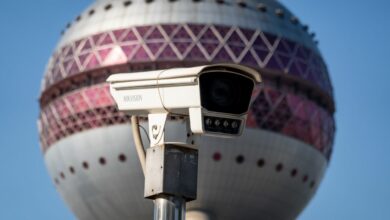At the behest of a senior ranking officer, a representative from State Security Investigation Services contacted television presenter Hala Sarhan of Dream TV in 2001 to urge her to “reconsider her direction” about airing an interview with Islamist leader Abdel Fatah Fahmy. A year later, State Security approached Sarhan again, requesting her not to air reruns of an interview with former Interior Minister al-Nabawy Ismail without prior permission from State Security. Sarhan felt compelled to acquiesce to the “requests.”
While State Security interfered in the media’s day-to-day affairs, its hidden and not-so-hidden reach extended to universities, media, non-governmental organizations, and people’s homes. It kept extensive records of its work.
Many documents penned by State Security officers – and often marked top secret – have made it to the public domain after protesters stormed several State Security buildings in Alexandria, 6th of October City and Nasr City. Later, an attempt to storm the main headquarters was rebuffed with force.
Activists have established a website called 25leaks.com to post these documents. The documents on Sarhan’s TV show and dozens of others can be found on the site in scanned format.
The site’s creators were unwilling to meet face to face with Al-Masry Al-Youm “due to the current circumstances and the military council's act of prohibiting the publication any documents,” they say, but agreed to answer questions via email.
They stated that the documents they posted were collected from State Security offices as well as from activists, but there are doubts regarding the authenticity of documents that had been posted.
Countering this claim, the site’s creators said some of the posted documents were taken from State Security Headquarters, that the victims cited in the documents could verify the claims, and that “there are a lot of facts, dates, signatures, stamps, victims names, officers names, phone numbers and other information that cannot be simply forged or faked,” the creators wrote in an email.
Assistant Secretary General of the Egyptian Organization for Human Rights Sherif Azer said, “From our work at the organization we believe that most of these documents are real, with few exceptions. We believe that because these documents include cases and violations that we already spotted and documented in our reports, and many of them are compatible with strategies that have been used by SS that we are aware of.”
Other documents on the site portray a deeply paranoid and gossipy entity focused on Islamist movements and how to counter them. One document stands out because it shows coordination with the former ruling National Democratic Party to infiltrate Islamist groups in Alexandria.
Documents also monitor the movement of Islamist leaders. One document states progress in tracking movement of Salafi leader Abdel Moneim Hanafi.
State Security also tracked government ministers. One document pertains to a memo -intercepted by State Security – sent by former Minister of Trade Rashid Mohamed Rashid.
According to those behind 25leaks.com, the document shows “the mentality of this regime which spied on everyone, even its devoted men.”
One document talks about a visit paid by State Security to the house of a man wanted for the assassination of former Parliament Speaker Rifaat al-Mahgoub. They found the man’s wife at home and the memo says that “she was placed under control.”
“State Security used to play this role before the revolution, infiltrating all bodies and organizations, depending on the absolute powers granted by the emergency law, in addition to undercover operations implemented outside any legal framework,” Azer said.
The documents, a window into one of the Middle East’s most notorious security bodies, may find their way into the annals of archival history. Khaled Fahmy, professor and chair of AUC’s Department of History, is heading a committee that will document the revolution for the National Archive.
He said the State Security documents were not part of the committee’s mandate but was something the National Archive itself was intending to discuss with the Ministry of Interior.
“The Interior Minister has announced on more than one occasion that the old State Security documents would be preserved at the National Archive, but which documents exactly and in what manner has not yet been specified.”
Fahmy says that before archivists include the documents in their collections, they must establish their authenticity. “This is the big question. You have to see the originals, not photocopies or scanned pictures,” he said. “Anyone can scan the pictures, if you want to ascertain their authenticity you have to see the original documents.”
After the events of 25 January, a decision was made to dissolve State Security and replace it with a new body, called the National Security Agency with limited powers. However, some allege that the change was merely cosmetic, especially since State Security emergency courts and State Security prosecution still exist.
“As long as we don’t see new faces that… and [continue] to see the officers who participated or gave orders of torturing and humiliating people, there will be no real differences,” say creators of 25leaks.com.



